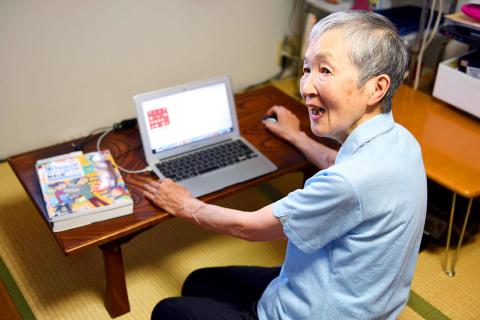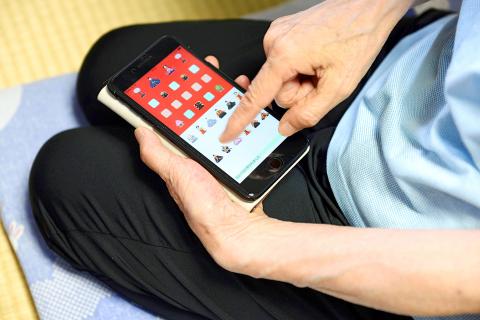When 82-year-old Masako Wakamiya first began working she still used an abacus for math — today she is one of the world’s oldest iPhone app developers, a trailblazer in making smartphones accessible for the elderly.
Frustrated by the lack of interest from the tech industry in engaging older people, she taught herself to code and set about doing it herself. The over-60s, she insists, need to actively search out new skills to stay nimble.
“As you age, you lose many things: your husband, your job, your hair, your eyesight. The minuses are quite numerous. But when you learn something new, whether it be programming or the piano, it is a plus, it’s motivating,” she says.

Photo: AFP
“Once you’ve achieved your professional life, you should return to school. In the era of the Internet, if you stop learning, it has consequences for your daily life,” Wakamiya explains at her home near Tokyo.
She became interested in computers in the 1990s when she retired from her job as a bank clerk. It took her months to set up her first system, beginning with bulletin board system messaging, a precursor to the Internet, before building her skills on a Microsoft PC, and then Apple’s Mac and iPhones. She asked software developers to come up with more for the elderly, but a repeated lack of response led her to take matters into her own hands.
Wakamiya learned the basics of coding and developed Hinadan, one of Japan’s first dedicated app games for the over-60s. She is now in such demand that this year Apple invited her to participate at their prestigious Worldwide Developers Conference, where she was the oldest app creator to take part.

Photo: AFP
INSPIRED BY DOLLS
Hinadan, or “the doll staircase,” was inspired by the Hina Matsuri, a doll festival which takes place every March, where ornamental dolls representing the emperor, his family and their guests are displayed in a specific arrangement.
In Wakamiya’s app, users have to put them in the correct positions — a task which is harder than it sounds, requiring memorization of the complex arrangements.
The app, which is currently only available in Japanese, has been downloaded 42,000 times with hundreds of positive comments from users. And while these figures are relatively small compared to Japan’s big-hitting apps which are downloaded in their millions, Hinadan has proved popular enough that Wakamiya plans to release English, Chinese and possibly French versions of the app before next year’s festival.
Its success has propelled her on to the tech world stage, despite the industry’s reputation for being notoriously ageist. In Silicon Valley, workers in their 40s are considered old by some firms and according to media reports citing research firm Payscale, the median age for an employee at Facebook is 29 and at Apple is 31.
But international tech firms and startups are slowly waking up to the economic potential of providing for silver surfers, and Wakamiya has already met with Apple’s chief executive Tim Cook.
Wakamiya recalls: “He asked me what I had done to make sure that older people could use the app. I explained that I’d thought about this in my programming — recognizing that older people lose their hearing and eyesight, and their fingers might not work so well.”
“Mr Cook complimented me,” she says proudly, adding that he had hailed her as a “source of inspiration.”
NO TIME FOR SICKNESS
Wakamiya concedes that she finds “writing lines of code is difficult” but has a voracious appetite to learn more.
“I want to really understand the fundamentals of programming, because at the moment I only learned the elements necessary for creating Hinadan,” she explains.
More than a quarter of Japan’s population is aged 65 and above, and this is projected to rise to 40 percent by 2055. The government is struggling to ensure its population remains active and healthy — and so also see the dynamic octogenarian as an inspiration.
“I would like to see all Japanese elderly people have the same motivation,” one official says.
Wakamiya says her ultimate goal is to come up with “other apps that can entertain older people and help transmit to young people the culture and traditions we old people possess.”
“Most old people have abandoned the idea of learning, but the fact that some are starting (again) is not only good for them but for the country’s economy,” says Wakamiya, who took up the piano at 75.
Hinting that her good health is down to an active mind and busy life, she adds: “I am so busy everyday that I have no time to look for diseases.”

The canonical shot of an East Asian city is a night skyline studded with towering apartment and office buildings, bright with neon and plastic signage, a landscape of energy and modernity. Another classic image is the same city seen from above, in which identical apartment towers march across the city, spilling out over nearby geography, like stylized soldiers colonizing new territory in a board game. Densely populated dynamic conurbations of money, technological innovation and convenience, it is hard to see the cities of East Asia as what they truly are: necropolises. Why is this? The East Asian development model, with

This is a deeply unsettling period in Taiwan. Uncertainties are everywhere while everyone waits for a small army of other shoes to drop on nearly every front. During challenging times, interesting political changes can happen, yet all three major political parties are beset with scandals, strife and self-inflicted wounds. As the ruling party, the Democratic Progressive Party (DPP) is held accountable for not only the challenges to the party, but also the nation. Taiwan is geopolitically and economically under threat. Domestically, the administration is under siege by the opposition-controlled legislature and growing discontent with what opponents characterize as arrogant, autocratic

June 16 to June 22 The following flyer appeared on the streets of Hsinchu on June 12, 1895: “Taipei has already fallen to the Japanese barbarians, who have brought great misery to our land and people. We heard that the Japanese occupiers will tax our gardens, our houses, our bodies, and even our chickens, dogs, cows and pigs. They wear their hair wild, carve their teeth, tattoo their foreheads, wear strange clothes and speak a strange language. How can we be ruled by such people?” Posted by civilian militia leader Wu Tang-hsing (吳湯興), it was a call to arms to retake

When Lisa, 20, laces into her ultra-high heels for her shift at a strip club in Ukraine’s Kharkiv, she knows that aside from dancing, she will have to comfort traumatized soldiers. Since Russia’s 2022 invasion, exhausted troops are the main clientele of the Flash Dancers club in the center of the northeastern city, just 20 kilometers from Russian forces. For some customers, it provides an “escape” from the war, said Valerya Zavatska — a 25-year-old law graduate who runs the club with her mother, an ex-dancer. But many are not there just for the show. They “want to talk about what hurts,” she